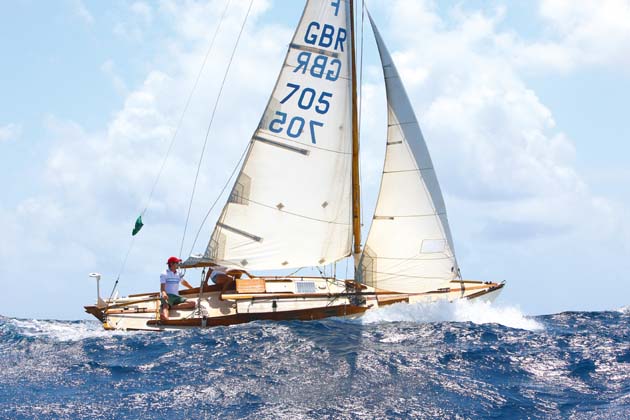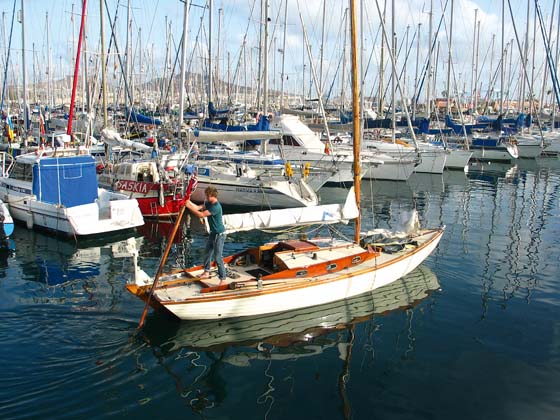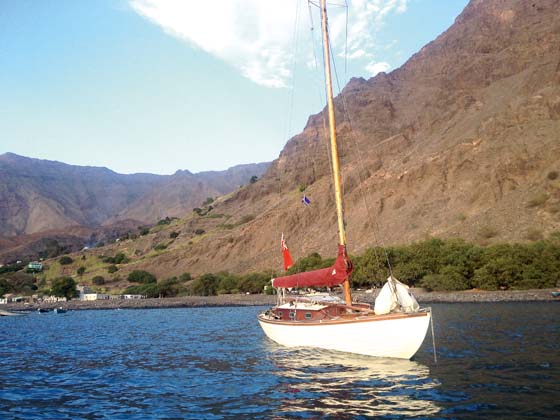Carrying his guitar, some fine wine, an old French racing bike and a sextant, Leo Goolden sets out on his first solo ocean crossing in a 24ft Folkboat
The most common one was always: “Did you sail that thing here?” which puzzled me slightly. It seemed to me a bit like watching someone park their car, and then asking them incredulously if they had driven it there.
I suppose the sheer tininess of Lorema makes her stand out, as well as the simplicity of the rig, and the obvious lack of any systems. As an original 1940s Swedish Folkboat, her beauty, I like to think, has something to do with it too. But she’s my boat, so I would.
I had been meandering around the Canaries for a couple of months, relishing deserted volcanic anchorages and welcoming harbours in equal measure, but now it was time to embark on my first serious solo ocean passage. Sensible as always, my girlfriend had jumped ship in desperation, and left on a catamaran with a toilet and a fridge and all sorts of other unfathomable modern luxuries.
Necessary junk
I had made the usual preparations of the nervous sailor, and filled my boat with all manner of provisions and spares. The sight of Lorema’s waterline was a distant memory. Among tonnes of food and water, I was also carrying all the other necessary junk of a cruising boat: a pair of speakers; a circular saw; a library of novels; a good few boxes of wine; several unreasonably large pieces of timber; and – of course – an old French racing bicycle. I had hauled myself aloft more times than I could count, emptied the local hardware store, phoned my parents and, finally, I was ready to depart.
I sculled out of my berth in Las Palmas, waving goodbye to friendly neighbours. My sails went up quickly, and I did a little lap of the anchorage before heading out of the harbour. As I weaved my way through the anchored container ships outside the port, the flukey inshore winds strengthened and the sheltered waters gave way to a moderate swell.
With two reefs in, I was propelled haphazardly through the wind acceleration zone that lies south-east of Gran Canaria, like a cork from a champagne bottle. And truly, I felt as insignificant as a cork, as the island disappeared and the unimaginable expanse of the Atlantic grew before me.
I didn’t get a great deal of sleep that first night, what with the shipping and the excitement of departure, but I managed a few minutes here and there. When sailing near shipping lanes or in coastal waters, I allow myself 20 minutes at a time if I have an empty horizon. In theory, this should be less time than it would take a fast ship on a collision course to rise over the horizon and run me over. The snooze button is a temptation that has to be fought religiously.
We managed to avoid any scuffles, and the sun rose to find Lorema still merrily floating along, so I set about dealing with a cup of tea and some breakfast. A good brew and some muesli will do wonders for a bleary head, and I realised I had been heading due south for long enough. I had been trying not to get caught in the large wind shadow of Gran Canaria, but it was about time to head west and avoid the large swell that builds up far off the coast of Morocco.
A wet passage to Cape Verdes
The wind and the swell were consistently strong, and I realised that I had a wet trip ahead. Folkboats are not known for being dry at the best of times, and my helming position is even more exposed owing to Lorema’s decked-over cockpit. Thankfully, my homemade wooden self-steering gear was looking after the helm admirably, and so I could stay sheltered inside the cabin. However, every time I went out to adjust something, I would get soaked.
To make matters worse, I had leaks around the mast and companionway. The main hatch, although pretty, is about as useful as a colander for keeping waves out. The small area under the hatch is not only the galley, but is also the only place where you can perch over a bucket in the morning. It’s particularly hard to do any serious toilet reading while rolling 45° each way under a small waterfall, and even harder to retain any sense of dignity.
I sailed on, trailing my faithful log, counting down the miles to the Cape Verde Islands. The sky was a little overcast, but I still managed to get enough sunsights to keep a good track of my position. My sextant is a plastic EBCO, equipped with old 35mm film to dim the sunlight. It was bought long ago for less than the price of a good meal and was given to me by friend and inspirational cruising sailor Nick Skeates. It has never let me down, and I plotted my course daily, taking great care to keep my charts and sight reduction tables dry. I watched my pencil marks edge south, parallel to the sparse and dangerous African coast.
The weather was relentless and tiring for eight wet days, and I didn’t once hoist a full main, but the breeze was almost always behind me, and it was hugely satisfying to cover so much distance. Finally, after 900 miles, I approached the Cape Verdes at the ideal time of day, just before sunrise.
The main navigation lights were nowhere to be found, but I was confident of my position, and followed the loom of Mindelo into the channel between São Vincente and Santo Antão. As I sailed closer to the islands, the sun rose behind volcanic peaks and lit up a prehistoric scene, silhouetting the giant stone claws that reach into the sky all around.
I was happy and relieved to have arrived and anchored, but though I was tired, I couldn’t sleep for the prospect of going ashore. When I had rowed ashore and navigated the necessary bureaucracy, I wandered around Mindelo, soaking up its culture and its colour, feeling as light as air.
Making friends in Mindelo
I spent a little time there, and did some work on the steering gear, the sails and the standing rigging. I gooped up some of the sources of leaks and, most importantly, made a cover for the main hatch. I made friends, notably with the lovely crew of the Sea Shepherd conservation boat stationed there, who I shocked by talking of my plans to decimate acres of ancient rainforest to build a boat in South America.
There was also a young Spanish cruising couple whom I showered with carrots (I bought enough in Las Palmas for an army), and a very kind boatful of Turks who fed me repeatedly and thought I was completely bonkers.
Jobs done, I got ready to skidaddle, but not before a night of music in a local bar. Inspired by the atmosphere in the town, I took my guitar and started playing sheepishly in a corner – and soon remembered what fun this is. The drinks come free, other musicians turn up, we all sing terrible songs, proclaim each other best friends for ever, and believe we have made something magical. Which we have, in a way.
And so, against all my previous resolutions, I set sail with a hangover once again. Ashamed at having visited only one island in the archipelago, I sailed round into the lee of Santo Antão. The strong wind gave way suddenly to wind shadow, and I went from three reefs to almost completely becalmed in a matter of feet. Eventually, though, I reached a tiny village called Tarrafal, nestled in a little valley underneath huge mountainous cliffs.
I spent two nights anchored off that sleepy village, wandering the rocky hills and relishing the feel of the hard earth beneath my feet. I spent the evenings eating and drinking with a generous couple who had arrived by yacht 15 years ago and had started a remote guest house. I was sorely tempted to stay longer, but the Caribbean beckoned, and I knew that the longer I put off my departure, the harder it would be.









